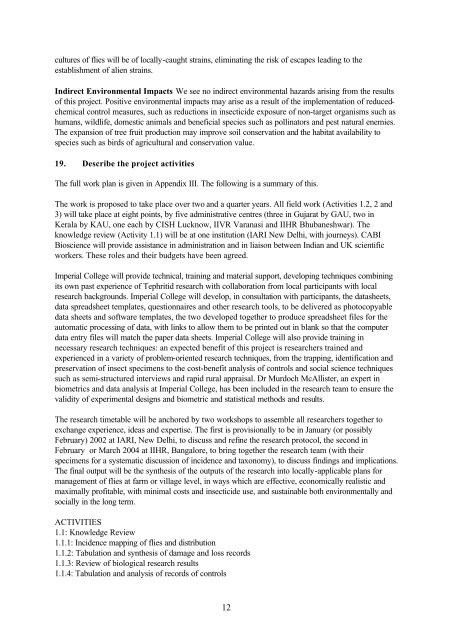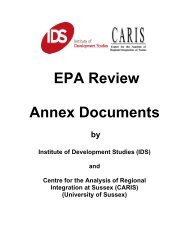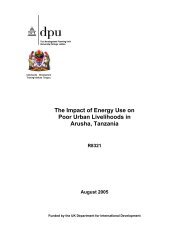“Key Informant Survey” of Production, Value, Losses and ... - DfID
“Key Informant Survey” of Production, Value, Losses and ... - DfID
“Key Informant Survey” of Production, Value, Losses and ... - DfID
Create successful ePaper yourself
Turn your PDF publications into a flip-book with our unique Google optimized e-Paper software.
cultures <strong>of</strong> flies will be <strong>of</strong> locally-caught strains, eliminating the risk <strong>of</strong> escapes leading to the<br />
establishment <strong>of</strong> alien strains.<br />
Indirect Environmental Impacts We see no indirect environmental hazards arising from the results<br />
<strong>of</strong> this project. Positive environmental impacts may arise as a result <strong>of</strong> the implementation <strong>of</strong> reducedchemical<br />
control measures, such as reductions in insecticide exposure <strong>of</strong> non-target organisms such as<br />
humans, wildlife, domestic animals <strong>and</strong> beneficial species such as pollinators <strong>and</strong> pest natural enemies.<br />
The expansion <strong>of</strong> tree fruit production may improve soil conservation <strong>and</strong> the habitat availability to<br />
species such as birds <strong>of</strong> agricultural <strong>and</strong> conservation value.<br />
19. Describe the project activities<br />
The full work plan is given in Appendix III. The following is a summary <strong>of</strong> this.<br />
The work is proposed to take place over two <strong>and</strong> a quarter years. All field work (Activities 1.2, 2 <strong>and</strong><br />
3) will take place at eight points, by five administrative centres (three in Gujarat by GAU, two in<br />
Kerala by KAU, one each by CISH Lucknow, IIVR Varanasi <strong>and</strong> IIHR Bhubaneshwar). The<br />
knowledge review (Activity 1.1) will be at one institution (IARI New Delhi, with journeys). CABI<br />
Bioscience will provide assistance in administration <strong>and</strong> in liaison between Indian <strong>and</strong> UK scientific<br />
workers. These roles <strong>and</strong> their budgets have been agreed.<br />
Imperial College will provide technical, training <strong>and</strong> material support, developing techniques combining<br />
its own past experience <strong>of</strong> Tephritid research with collaboration from local participants with local<br />
research backgrounds. Imperial College will develop, in consultation with participants, the datasheets,<br />
data spreadsheet templates, questionnaires <strong>and</strong> other research tools, to be delivered as photocopyable<br />
data sheets <strong>and</strong> s<strong>of</strong>tware templates, the two developed together to produce spreadsheet files for the<br />
automatic processing <strong>of</strong> data, with links to allow them to be printed out in blank so that the computer<br />
data entry files will match the paper data sheets. Imperial College will also provide training in<br />
necessary research techniques: an expected benefit <strong>of</strong> this project is researchers trained <strong>and</strong><br />
experienced in a variety <strong>of</strong> problem-oriented research techniques, from the trapping, identification <strong>and</strong><br />
preservation <strong>of</strong> insect specimens to the cost-benefit analysis <strong>of</strong> controls <strong>and</strong> social science techniques<br />
such as semi-structured interviews <strong>and</strong> rapid rural appraisal. Dr Murdoch McAllister, an expert in<br />
biometrics <strong>and</strong> data analysis at Imperial College, has been included in the research team to ensure the<br />
validity <strong>of</strong> experimental designs <strong>and</strong> biometric <strong>and</strong> statistical methods <strong>and</strong> results.<br />
The research timetable will be anchored by two workshops to assemble all researchers together to<br />
exchange experience, ideas <strong>and</strong> expertise. The first is provisionally to be in January (or possibly<br />
February) 2002 at IARI, New Delhi, to discuss <strong>and</strong> refine the research protocol, the second in<br />
February or March 2004 at IIHR, Bangalore, to bring together the research team (with their<br />
specimens for a systematic discussion <strong>of</strong> incidence <strong>and</strong> taxonomy), to discuss findings <strong>and</strong> implications.<br />
The final output will be the synthesis <strong>of</strong> the outputs <strong>of</strong> the research into locally-applicable plans for<br />
management <strong>of</strong> flies at farm or village level, in ways which are effective, economically realistic <strong>and</strong><br />
maximally pr<strong>of</strong>itable, with minimal costs <strong>and</strong> insecticide use, <strong>and</strong> sustainable both environmentally <strong>and</strong><br />
socially in the long term.<br />
ACTIVITIES<br />
1.1: Knowledge Review<br />
1.1.1: Incidence mapping <strong>of</strong> flies <strong>and</strong> distribution<br />
1.1.2: Tabulation <strong>and</strong> synthesis <strong>of</strong> damage <strong>and</strong> loss records<br />
1.1.3: Review <strong>of</strong> biological research results<br />
1.1.4: Tabulation <strong>and</strong> analysis <strong>of</strong> records <strong>of</strong> controls<br />
12

















